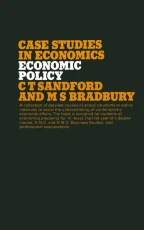
The efforts of a government to stabilise the internal economy of its country’s primary production can be supplemented by international action to control or regulate world markets. The fortunes of Ghanaian and Nigerian cocoa are obviously affected by activity in competing countries, and co-operating policies could affect the welfare of all producers. This is the purpose of international agreements, although importing countries also have an interest — manufacturers can be upset by commodity fluctuations or prices that are kept high by control. Nor is it true that all producers have the same interest: high-cost producers desire a higher maintained price than low-cost; established producers have a greater interest in restricting production than new entrants.
This is a preview of subscription content, log in via an institution to check access.
eBook EUR 6.99 Price includes VAT (France)
Softcover Book EUR 10.54 Price includes VAT (France)
Tax calculation will be finalised at checkout
Purchases are for personal use only